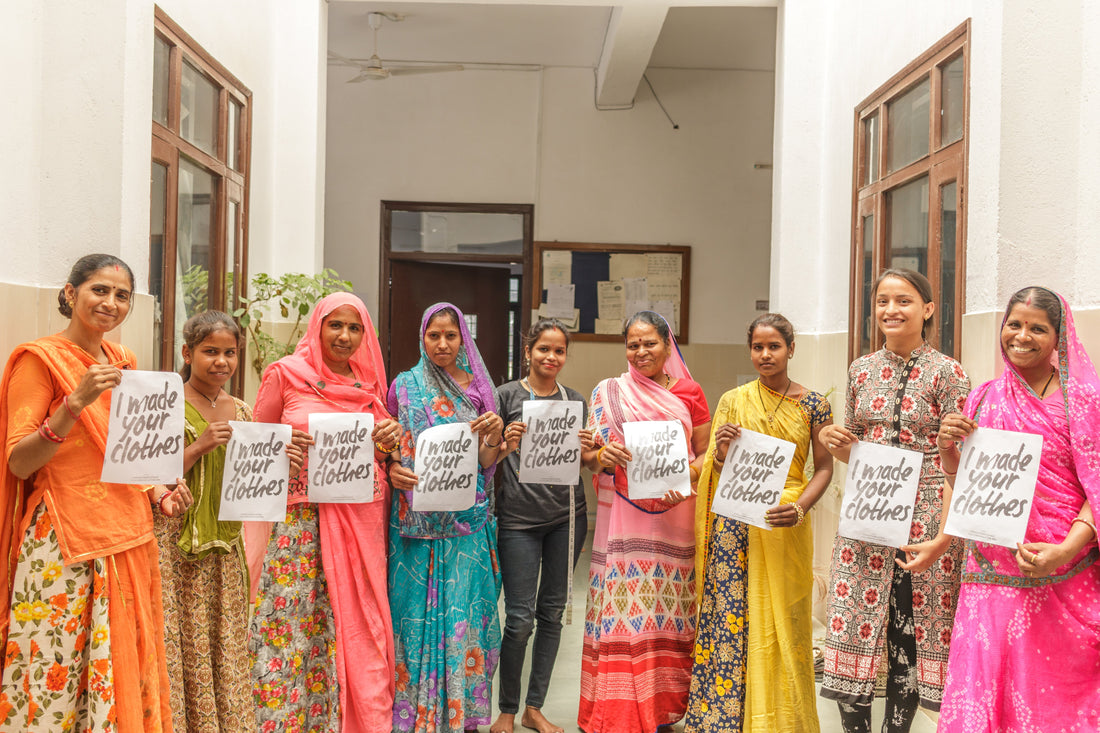
The Dressmakers of Delwara
Share
It was a quiet day, when we arrived, in Kamli Ka Guda. The expansive highways that stretch out of Udaipur give way to the less-travelled road that leads to Delwara. Once a dukedom of the princely state of Mewar, Delwara is, today, a popular temple town. Much of its hustle bustle is centred around a famous Shiv temple that draws in devotees from around Rajasthan and around the country.
Kamli Ka Guda is a small hamlet in this small town. A road slopes through it and wandering goats watch you idly as you walk by. There are only a handful of shops – all of them compact and doling out nothing more than daily groceries. In a quiet hamlet, a small home at the corner of the main street is a hub of activity.
Move past the gates to a sparse living room and a handful of women sit on the floor. Their heads covered in bright-hued chunnis (a long scarf). In their hands, they hold needles, looped with embroidery threads that create neat, rows of stitches across the pink kurtas (a tunic of sorts) that drape their laps. Occasionally, they’ll lift their heads for a quick chat or to compare notes on how the designs, on the kurtas, are shaping up.
But today is not just another day. A quality inspector from the nearby Sadhna facilitation centre is visiting. The women pay close attention to the instructions being doled out. The charm of handcrafted work may be that no two pieces are the same, yet, SADHNA, a social enterprise that took root in Udaipur in 1988 and employs over 700 home-based workers in and around Udaipur, has strict quality protocols. And the women have to be careful to follow these if they want their pieces to pass the litmus test.
After the instructions are given out, Roop Kumar takes charge. She ensures that every member of the group gathered has understood the instructions thoroughly. After all, the responsibility of making sure that the group works together to deliver the order on time, lies squarely on her shoulders. Once she had made sure all the women are confident of what needs to be done. She heads home to work on her bit of the order.
From her modest one-room home, Roop Kumar makes clothes for a well-known Indian brand that not just has more than a handful of showrooms in all of the country’s metros but also ships to over 40 countries the world over.
While Kumar knows the name of the brand she makes handcrafted pieces for. She does not know where the product will be sold and who it will be sold to. However, what she is sure about is that her earnings have played an important role in her family finding its financial footing and has helped her keep her two, young daughters in school.
A short, upward climb from Roop Kumar’s abode brings us to Rachu’s home. She’s busy with her order at her doorstep while her sons, who have a holiday from school, take up small chores around the house.
All of Rachu’s earnings go into a savings account. Though Sadhna works with home-based workers, who are an integral part of India’s informal economy, the organisation insists on banks accounts for each of its members. Having their own bank accounts helps women workers, like Rachu, achieve financial autonomy and cements a secure future that is not dependent on others.
When her husband passed away years ago, Sobha’s traditional embroidery skills that she learnt from her mother came to her rescue. She joined Sadhna and in the decade or so that she has been associated with the organisation, Sobha has put her two daughters through college. “I will not get my second daughter married early. I will make sure she studies and establishes a career. I’m also going to support my elder daughter too when she takes up a teaching course.”
Sobha says emphatically.
Rajasthan is one of India’s largest states and yet has one of the lowest rates of female literacy, faring poorer than many countries in the Arab world. Yet, all of the women, home-based workers working with Sadhna, in Kamli Ka Guda, expressed an unwavering commitment to educating their girls.
One of the first women, in the community, to work with Sadhna, Maya Kumari, a widow who lives with married sons, is happy that she’s financially independent. During the day, she works out of her home while also taking care of her grandchildren. Though it slows her down, she has no qualms in taking up the responsibility of childcare because she wants her daughters-in-law to be able to work. She hopes that one day childcare is not an incentive but a norm for women at the workplace.
Maya Kumari, like all of Sadhna’s home-based artisans, not just receives a fair wage for the work she puts in. Sadhna has also linked her with State-backed pension schemes, insurance and medical benefits.
Home-based workers are a the backbobe of the Sadhna enterprise. However, Sadhna employs women workers across all its production stages. At its facilitation centres, in Udaipur and Delwara, women sew the kurtas and other apparel that home-based workers, then, embellish with their hand work.
Women also take the lead in areas like cutting, dyeing, sorting, quality checking and packaging.
The final products travel to all corners of India and overseas – as far as Japan and the United States, Carrying with them a piece of Kamli Ka Guda.
